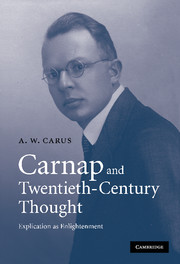Book contents
- Frontmatter
- Contents
- Preface
- Note on the style of citation
- Introduction
- 1 The cultural inheritance
- 2 The intellectual inheritance: positivism and Kantianism
- 3 The grand plan of a ‘system of knowledge’: science and logic
- 4 Carnap's early neo-Kantianism
- 5 The impact of Russell
- 6 Rational reconstruction
- 7 The impact of Wittgenstein
- 8 The crisis of rational reconstruction, 1929–1930
- 9 Liberation
- 10 Tolerance
- 11 The ideal of explication
- Bibliography
- Index
Preface
Published online by Cambridge University Press: 22 September 2009
- Frontmatter
- Contents
- Preface
- Note on the style of citation
- Introduction
- 1 The cultural inheritance
- 2 The intellectual inheritance: positivism and Kantianism
- 3 The grand plan of a ‘system of knowledge’: science and logic
- 4 Carnap's early neo-Kantianism
- 5 The impact of Russell
- 6 Rational reconstruction
- 7 The impact of Wittgenstein
- 8 The crisis of rational reconstruction, 1929–1930
- 9 Liberation
- 10 Tolerance
- 11 The ideal of explication
- Bibliography
- Index
Summary
Mathematicians, unlike the rest of us, have retained something of the original Enlightenment spirit, thought the novelist Robert Musil; they provide examples of a spiritual daring that has otherwise fallen by the wayside. ‘We others’, Musil regretted, ‘have let our courage drop since the time of the Enlightenment. Some small bungle was enough to get us off the track of reason, and we now let every soft-headed visionary denounce the projects of a d'Alembert or a Diderot as misguided rationalism.’ We are apt to plead the cause of feeling against the intellect, forgetting that we inhabit an intellect-constructed world (Musil 1913a). By ‘we’ he meant Central Europeans of the early twentieth century, but his warnings are no less relevant to our own times. ‘We must be on our guard, above all’, he wrote, ‘against all yearnings for the de-complication of literature and life, for Homeric or religious warmth, for uniformity and wholeness’ (Musil 1913b).
The western philosophical tradition began with the idea that insight or knowledge about the nature of things could somehow be applied by human beings to the shaping of their lives. For Plato, the paradigm of such knowledge or insight was geometrical proof. The applicability of knowledge, particularly de rerum naturae, to life was equally important for many others in antiquity, including non-Platonists such as Lucretius. This philosophical ideal reawoke in late medieval Europe, and was partly responsible for the creation of modern science in the seventeenth century.
- Type
- Chapter
- Information
- Carnap and Twentieth-Century ThoughtExplication as Enlightenment, pp. ix - xiiiPublisher: Cambridge University PressPrint publication year: 2007

